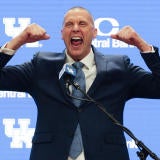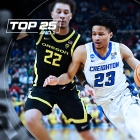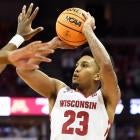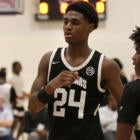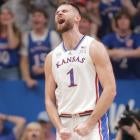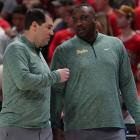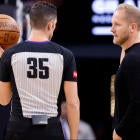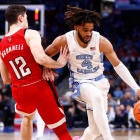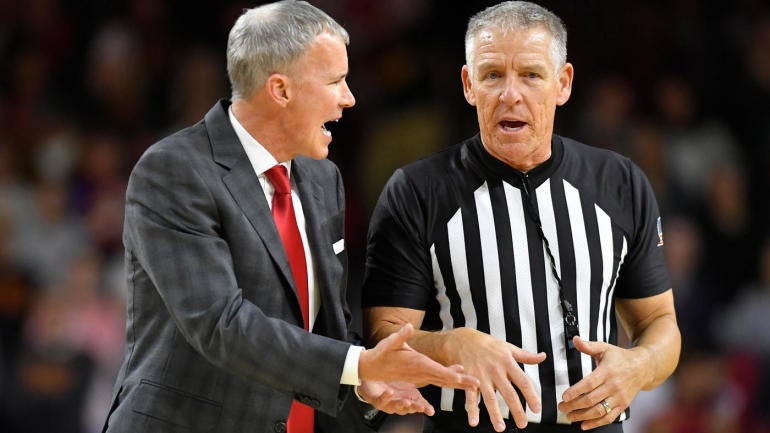
It's late afternoon on an early August Tuesday and Evon Burroughs is on patrol. The police scanner crackles to life in the background. The 40-year-old is in the Special Operations Unit for the Boston PD, where he's been an officer for 16 years. Burroughs works in tactical, meaning when there's a dangerous incident, his squad goes first.
Policing is Burroughs' life -- on the streets of Boston and the sidelines of college basketball. He's been a men's D-I official for 11 years, working the whistle in the Big East, the ACC, the A-10, Patriot League and Ivy League.
But Burroughs and more than 1,000 other officials at the D-I level -- not to mention thousands more across all of college sports -- sit in anxious limbo. As college football awaits its true scheduling fate to be decided in the coming weeks, college basketball is not far behind. A decision about 2020-21 is expected in September.
When we talk about the resumption of college athletics and all the uncomfortable, unavoidable entanglements therein, referees are mostly not acknowledged. But they're of course critical; the games are not legitimate without them. And though Burroughs has a lifelong occupation to fall back on, that's not the case for plenty of refs. Take Roger Ayers, who is universally regarded as the very best of the very best. His only job is being a college basketball official. The same is true of Randy McCall and Chris Rastatter, two veteran officials who live in Colorado and Arizona, respectively, and have been cautiously optimistic about working again in 2020.
Rastatter got into officiating in his late 20s when he called a men's rec league game on a lark after no one showed up. He made nine bucks. A little more than three years later he was in Pac-10. He's now 58 and his entire salary comes from officiating. Officials are not on multi-year contracts. They renew based on performance and review every summer.
"I'm not concerned yet," Rastatter said. "Do I want to dip into my savings? No, but I've got enough to get me through the next season. And that's an interesting part of that, is that you almost have to live that way because we'll go for six or eight months with no income."
Rastatter found a workaround of sorts, too. He incorporated himself some years back. Because of this, he was able to successfully apply for and receive the federal government's PPE loan in the spring.
"It's paying off now, I mean we ended up losing -- we got one game in the conference tournaments and then zero NCAA Tournament, so that's a pretty good hit," he said.
The going rate for working a power-conference game is right around $3,000. At the small-conference level, it floats around $1,300. The November tournaments pay out around $2,000 per game. What remains unknown is not just game inventory, but pay structure going forward. Burroughs worked the Patriot League final, the last game tied to an automatic bid for the defunct 2020 NCAA Tournament. At that time, officials' protocols were already in place for hand sanitizers and social distancing as best as possible with each other, coaches and players.
As a public servant, Burroughs isn't opposed to starting on time in November.
"We just have to be able to just do what's right and sensible," he said. "If we could sensibly have a season and starting on time, I'd be all for it. If we err on the side of caution, then I would totally understand that also."
He also had his first child three months ago, and that will be taken into account as well. Most officials I spoke with -- almost all of them between 52 and 61 years old -- said they're eager and willing to return.
"If they call me to go to work tomorrow, I'm ready," Donnie Eppley said. He's 57 and has been a D-I official for 23 years. His statement doesn't come lightly: Eppley worked the NEC final in March, then received a text the next week from a colleague who worked that title game and subsequently tested positive for the coronavirus.
Eppley also runs the International Association of Approved Basketball Officials, a network of approximately 15,000 high school referees worldwide. If there's one college official who's been entrenched in the logistics of getting refs back onto the court and the legalities that surround all of it, it's him.
"It does it look like we're not going to start until like after Jan. 1 on that side, and on the high school side it's tricky," Eppley said.
The growing feeling among D-I coaches is that the season won't start until January, but that's not the stance of the NCAA or any of the conferences yet -- not even in an informal sense within their ranks. Hope still reigns supreme. However, hope is not a plan and hints of a delay are already emerging. At this point in a normal year, officials are sent their annual contracts for renewal from each league. Those haven't been sent yet. And informal calls haven't yet been made to top-tier guys -- all the names you'll see in this story are A-level officials -- about their availability to work the big November tournaments.
"A lot of scheduling is scheduled around TV schedules," McCall said. "So if the networks aren't going to start putting together their schedule, I would imagine it's difficult for a coordinator to put together his schedule as well."
Contingencies are already being considered. One of the most widespread rumors in the officiating ranks right now is that all travel will be regional, meaning almost no getting on airplanes.
"At this point, am I afraid to go get on an airplane? I'm a bit hesitant right now, yeah," McCall said. "But I don't know how I'll feel about that when we get to November or December or January."
Officials could be asked to only work games in the leagues they're assigned to by driving a reasonable distance to those schools. That can benefit someone like Ayers, who lives in Virginia and has access to many campuses. But what about McCall, someone good enough to have called five Final Fours but who is also perched in the mile-high air of Colorado and is only "close" to a handful of programs? He normally puts in 80-85 games in a season.
"I officiate, and that's what I do, that's where I spend my time," McCall said. "I think we're just stuck in a wait-and-see, which is kind of an uncomfortable position."
And if there is a season that consists only of intra-conference play, that means game inventory will slash by more than 40%, an outcome that would have a big impact on a profession that requires its officials to pay for all of their travel, meals, rental cars -- every single expense. If game rates go down, and it easily could, then it complicates matters further.
"We talk a lot among our fraternity, there's no question there's a lot of concern, there's a lot of folks out there with some fear," Doug Shows, a five-time Final Four official, told me. "You know how dangerous this virus can be to someone, but at the same time I believe most guys I've spoken to, we're very optimistic. I think we're all ready to return to work. I do believe that there's light at the end of the tunnel. And if everything is done properly and safely, then we can all get back on the basketball court."
Will seniority win out, and will hundreds of B-level officials see their opportunities go from working 50 games down to maybe 10 or 12? Might some of the established guys who do have a second career give up some games to make opportunities for others who rely on those checks, and if that happened, how would the veteran coaches respond to that? One of the hush-hush things about college basketball is just how privately vocal coaches can be about who does and does not work their games.
"I'm obviously keeping an eye on it, and waiting to see what happens with football because football drives the bus," Rastatter said. "And if it goes down by 50%, thank you. I'll tell you right now, 50% is better than zero. So, you know. We'll do whatever. We're basketball referees. They want us to wear a mask, I guarantee you, we will wear a mask."
Ayers echoed the sentiment, expressing watchful optimism.
"I'll do whatever they want me to do," Ayers said. "And if that means a limited schedule, and I get in a car and drive to them, I'm fine with that as well. A big thing is I think we officials -- but also players, coaches -- work extremely hard. We all need a season. We're all in this together. And I think we all want to play and we'll do whatever we possibly can to do it and do it safely."
There's also ongoing debates about what may change with protocols for referees. Masks with whistle capability are being made; NBA officials are wearing one with a whistle pouch that has been developed by Fox 40. Eppley shared a memo with CBS Sports that shows the National Federation of High Schools has cleared allowance for push-button whistles (so: no blowing) to be used for the upcoming season. It remains to be seen if such an option would be used in college.
"Students' safety is the biggest factor for the schools, I would assume, and for us as officials, we always talk about putting the player safety first," Burroughs said.
Said Shows: "I know that we have a lot of confidence in our commissioners and athletic directors, and they'll provide a safe environment for the games to return in November." (Interestingly enough: McCall and Shows worked a classic Elite Eight game together: Illinois' comeback in 2005 over Arizona.)
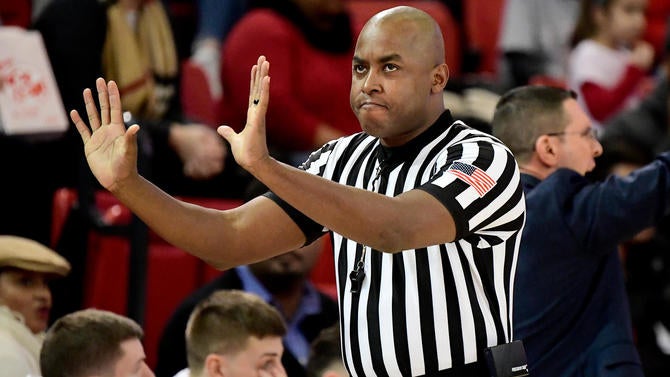
But while most officials would agree with Shows' general sentiment, there is disagreement about how achievable starting a season even is.
"I don't even know if we should be talking about playing football," McCall said. "I have a son that's a high school athlete, and I know [Colorado] is addressing all those issues and they need to talk about those things. But at the same time what we really need to focus on is finding a way to to handle the medical issue. And until we do that I think all of the other conversations are really difficult to have, because if we can't manage the pandemic then we can't play football. We can't play basketball. We can't do any of those things."
Tony Greene agrees. A 61-year-old project manager for the State of Georgia's economic development department, Greene's worked in government just as long as he's worked the sidelines: more than 30 years. A seven-time Final Four vet, Greene's been sitting at home since March. He was working the SEC Tournament when all came to a halt. And Greene's the one official I spoke with -- he's also the oldest -- who would not commit to officiating if the situation in the country doesn't change whenever the start of the season comes.
"I'd have to be impressed," he said. "I'd have to look at where we are in November. If things are basically the same, to me, that's not putting us in a more-positive situation. You talk about the bubble of the NBA, and I have friends in the bubble, we don't have anything like that. Where we'll be going people will be coming and going free as a bird. … For us to be out there with no mask, those are some of the things I would have to think about."
Greene also supervises all officials for the Southern Intercollegiate Athletic Conference, a D-II institution. He expects officials at the D-I and D-II level to opt out or significantly reduce their workload if we get to a season. His position on this issue is informed by his leadership role within officiating.
"Individually, people are going to have to make decisions based upon if they start on time or if they delay things and what the medical science is saying out there there and if they want to put themselves in a position to officiate," Greene said.
Expect officials to have to sign waivers. These are men and women who already pay for their own liability and disability insurance, too. Rastatter is the president of the western region of the Men's Basketball Officials Association. Normally officials attend and/or work camps that feed into the camaraderie of the profession and also give cherished opportunities to younger people in the profession a chance to learn, grow, network -- with the hopes of one day being a big-conference official or even getting to the NBA. It's what Ayers and so many others did in the early 1990s. That's been lost this year.
"The top guys I talk to, and obviously we're talking a lot -- texts, phone calls, emails -- a lot of concern," Ayers said. "I don't think any of us thought we'd be here [in] August and starting to have some real concerns about college football and if they're going to be able to pull it off."
A common sentiment among the officials I spoke with: the element of the unknown is unsettling to people who take on this profession. It's about organization, rules, structure. It's why a lot of men and women are starting to get fidgety and have understandable worry.
"I think we're all aware of what could happen but realistically, I'm more concerned with how our society deals with COVID," McCall said. "Because if we don't deal with COVID, then chances of us playing are not very good."
So as we move deeper into August and creep ever closer to facing the realities of a college basketball season, keep the officials in mind. They're beloved hated targets for fans, but they're real people. And getting them assigned to games with protocols (and dealing with the economics) is as big of an undertaking as any other aspect of college athletics.
The fact we still have almost no answers on that end is not an optimistic sign, but college basketball still does have time. The proverbial shot clock is starting to tick, though, and officials across the country have their eyes locked in on the countdown.







